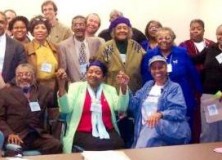 Dialogue sessions bridge differences and permit understanding among stakeholders who have widely divergent points of view. As an introductory process in initiating collaboration or resolving a collective issue, their purpose is not to determine which party is right, but rather to discover the richness that diverse perceptions emerging from a group lend to the issue at hand. Ideally, the process will uncover the best solution to a problem or the best angle from which to approach finding a solution.
Dialogue sessions bridge differences and permit understanding among stakeholders who have widely divergent points of view. As an introductory process in initiating collaboration or resolving a collective issue, their purpose is not to determine which party is right, but rather to discover the richness that diverse perceptions emerging from a group lend to the issue at hand. Ideally, the process will uncover the best solution to a problem or the best angle from which to approach finding a solution.
A variety of communication skills, such as, tolerating opposing views, suspending judgment and empathic listening, are indispensable to a successful Dialogue process. Participants must spell out all tacit assumptions and outline all thought processes, so as to allow others to add new dimensions to what they are thinking, free of any preconceptions.
 Outreach is an important part of any advocates’ work and community dialogue sessions can promote discussion of important issues that can can clear up confusion about government or community-led programs. These events are also less time intensive than organizing a larger community forum.
Outreach is an important part of any advocates’ work and community dialogue sessions can promote discussion of important issues that can can clear up confusion about government or community-led programs. These events are also less time intensive than organizing a larger community forum.
The nature of SCRC’s work necessitates that we begin most of our outreach effort through Dialogue sessions. As an introduction to the CBPR process, the SCRC has introduced this technique, specifically in the Environmental Health Project, where participants reflected on issues pertaining to Atlanta’s environmental issues.

